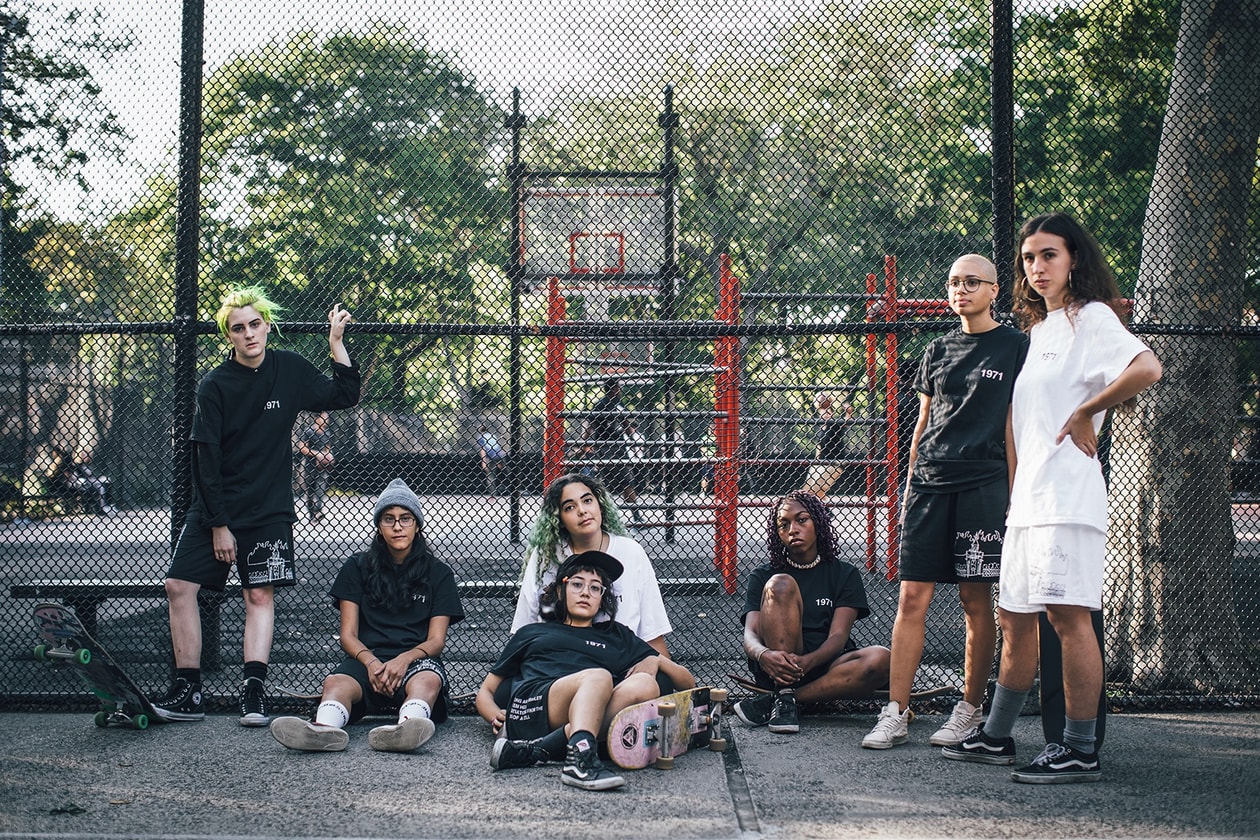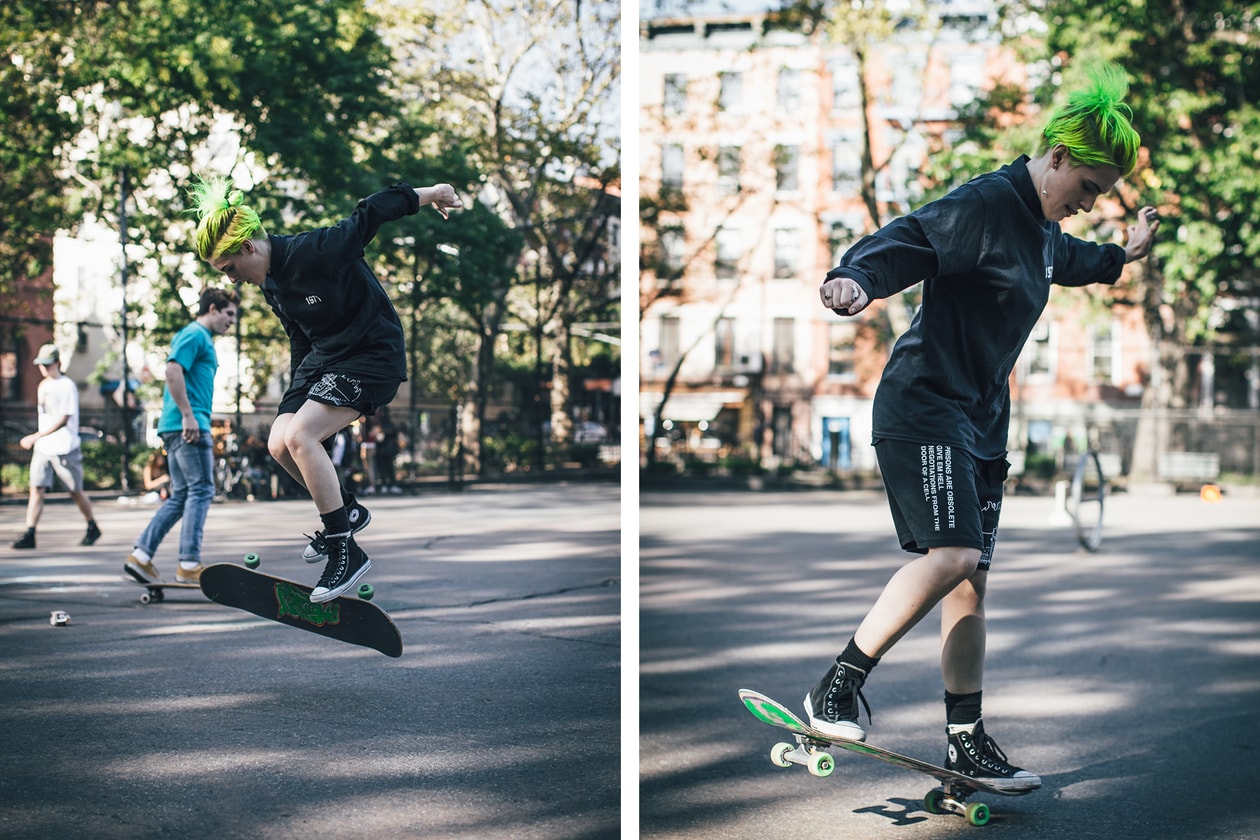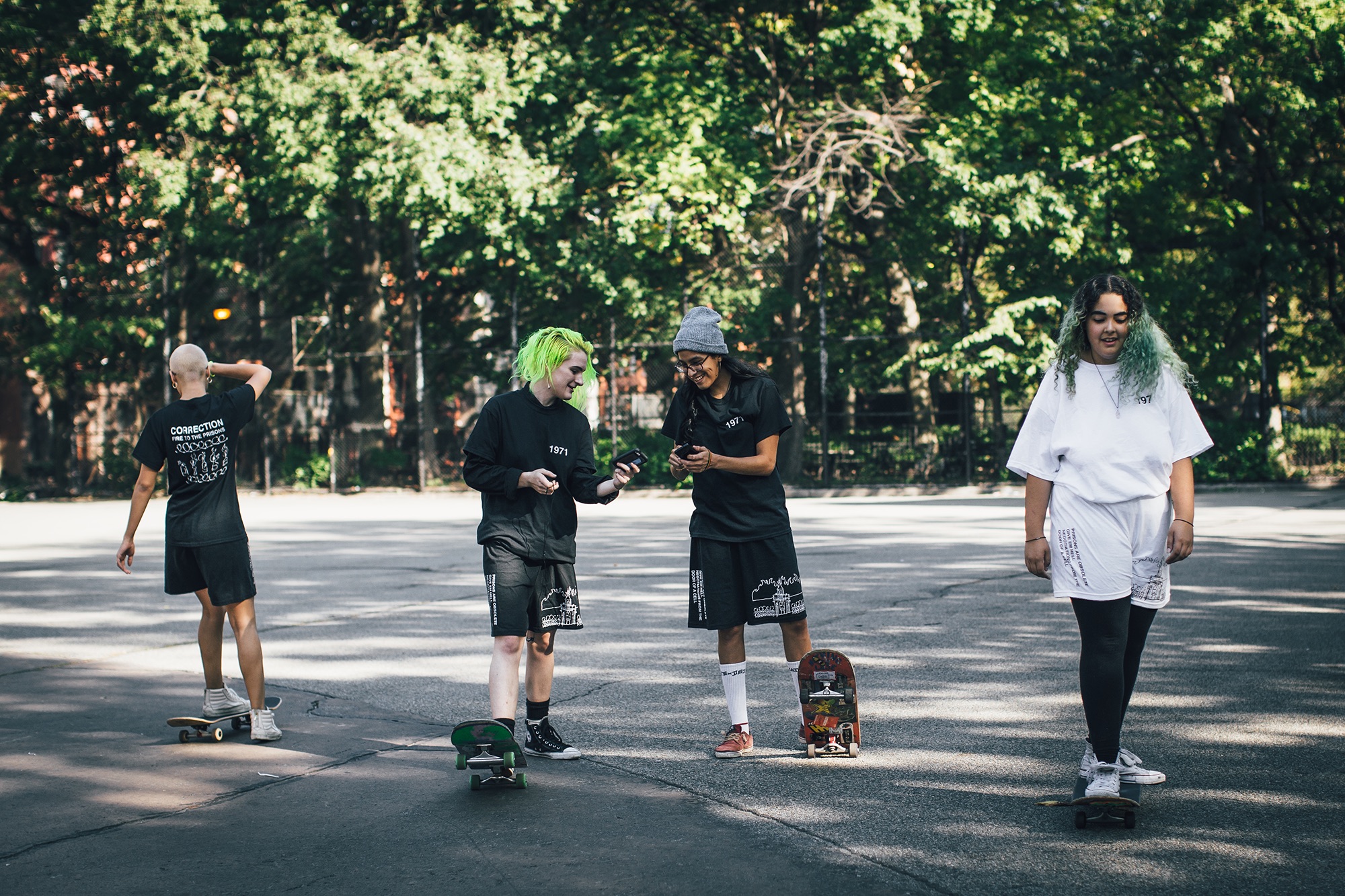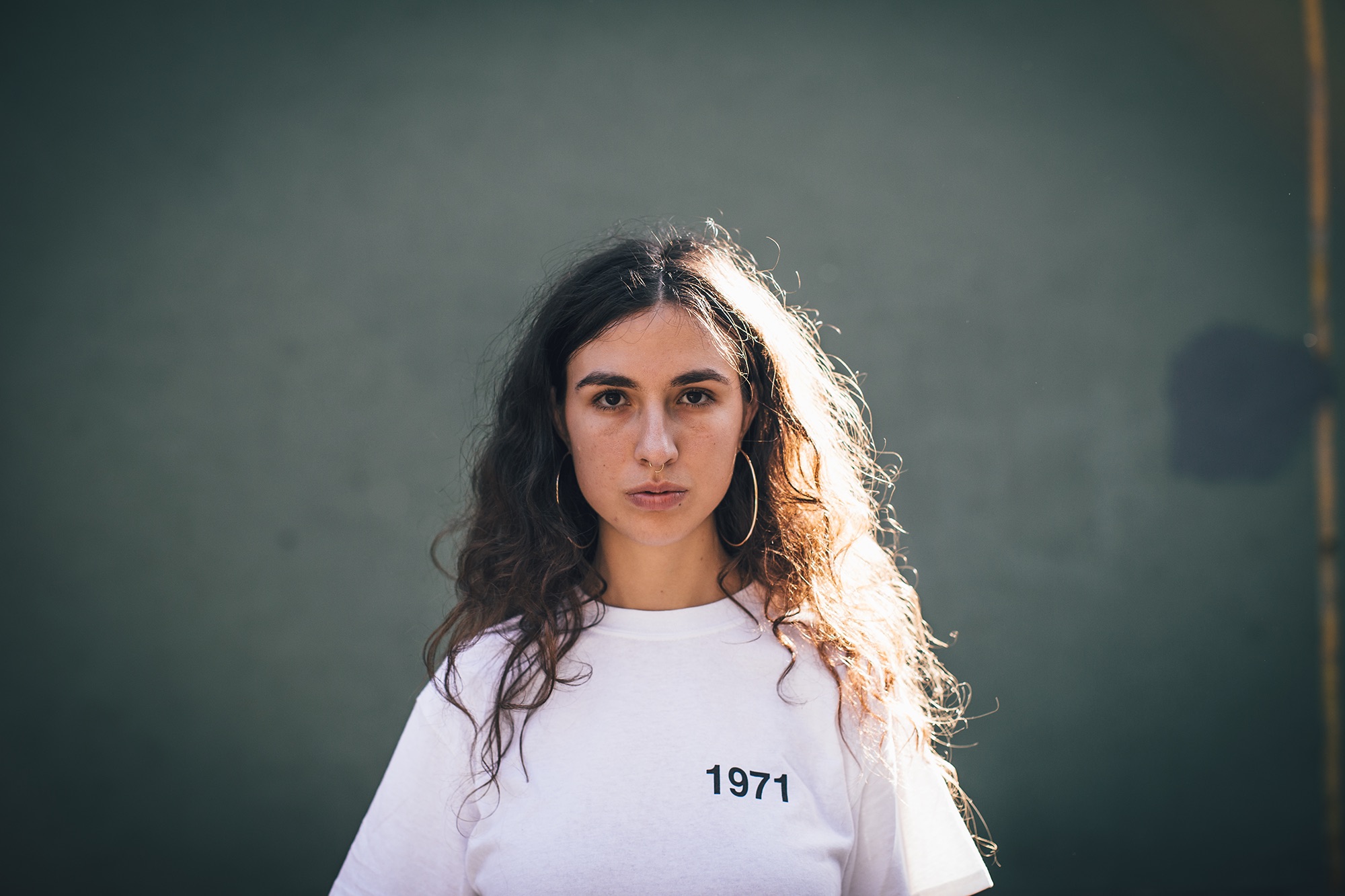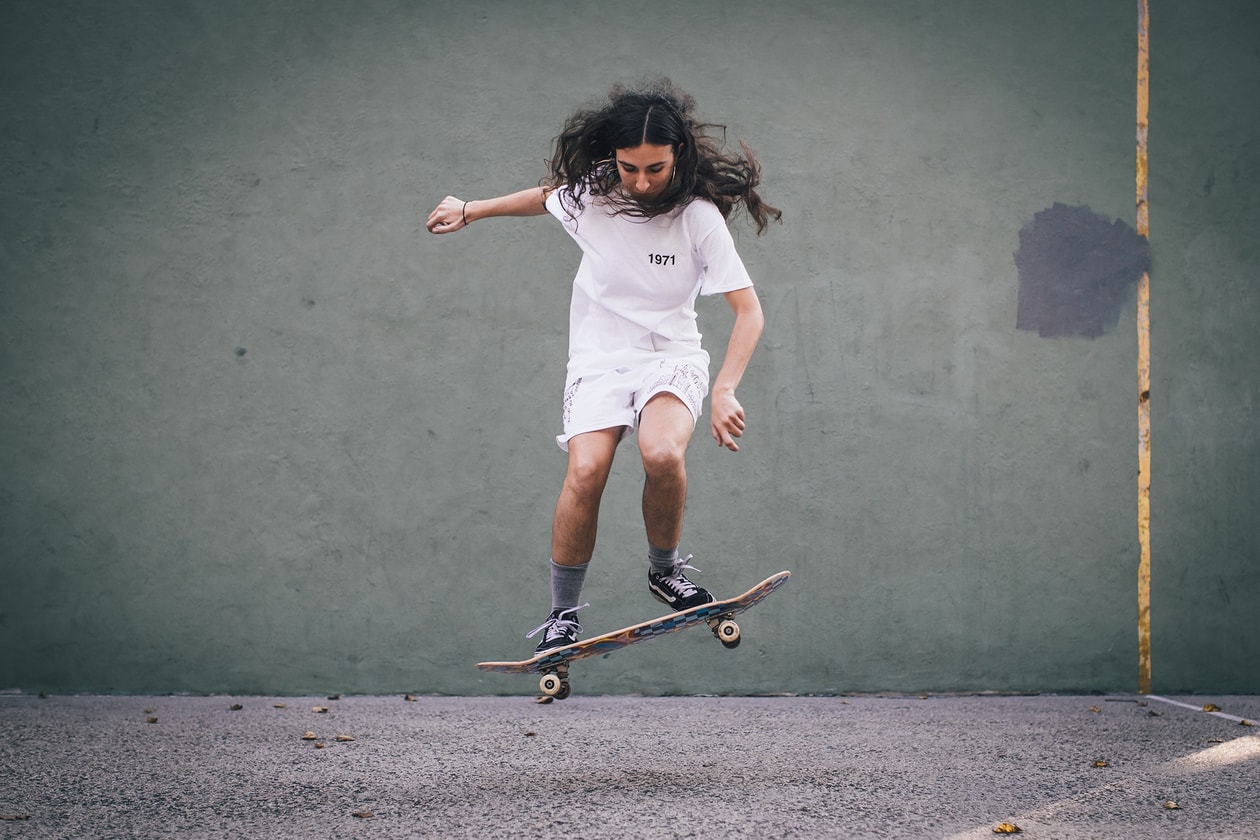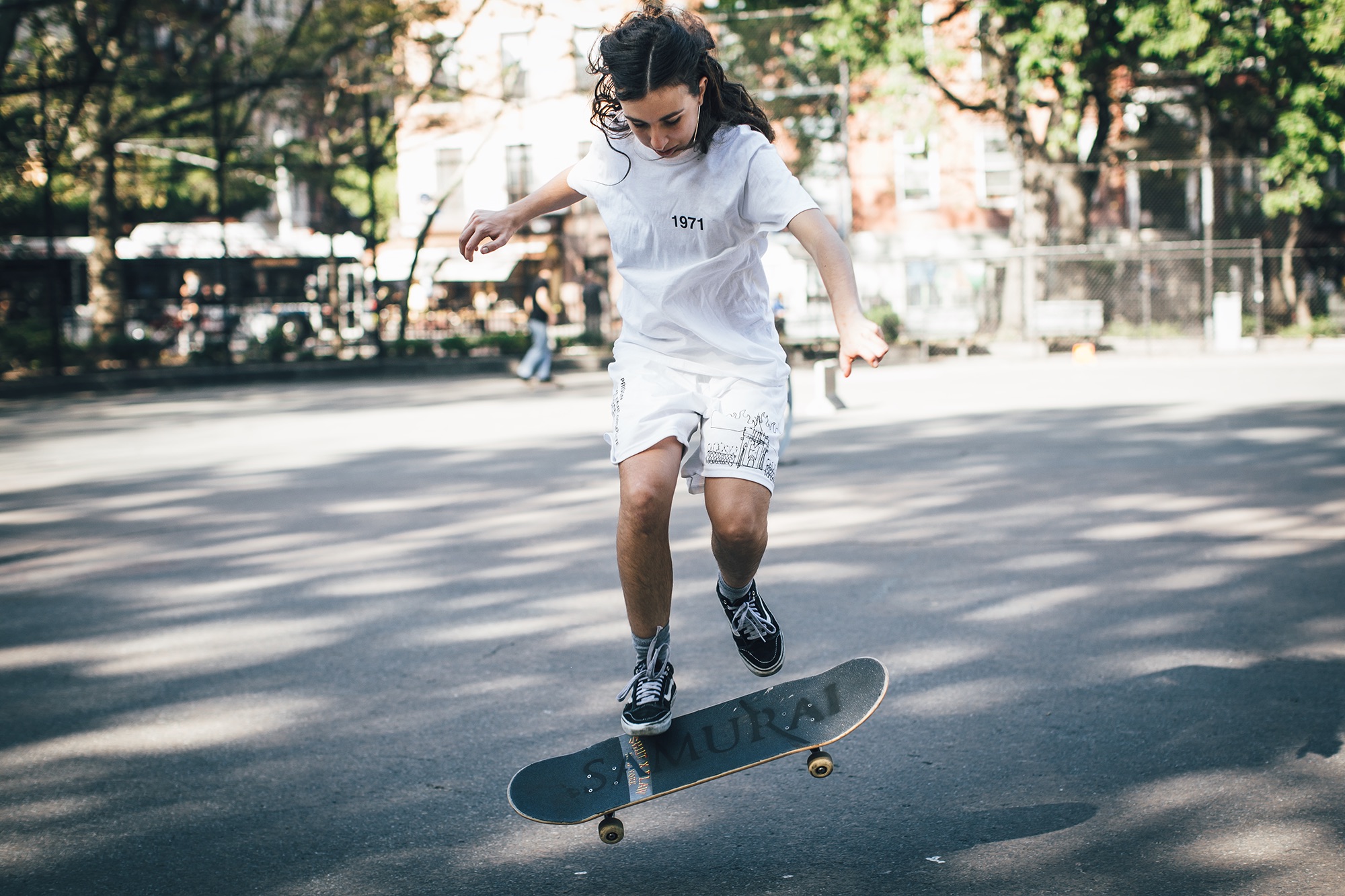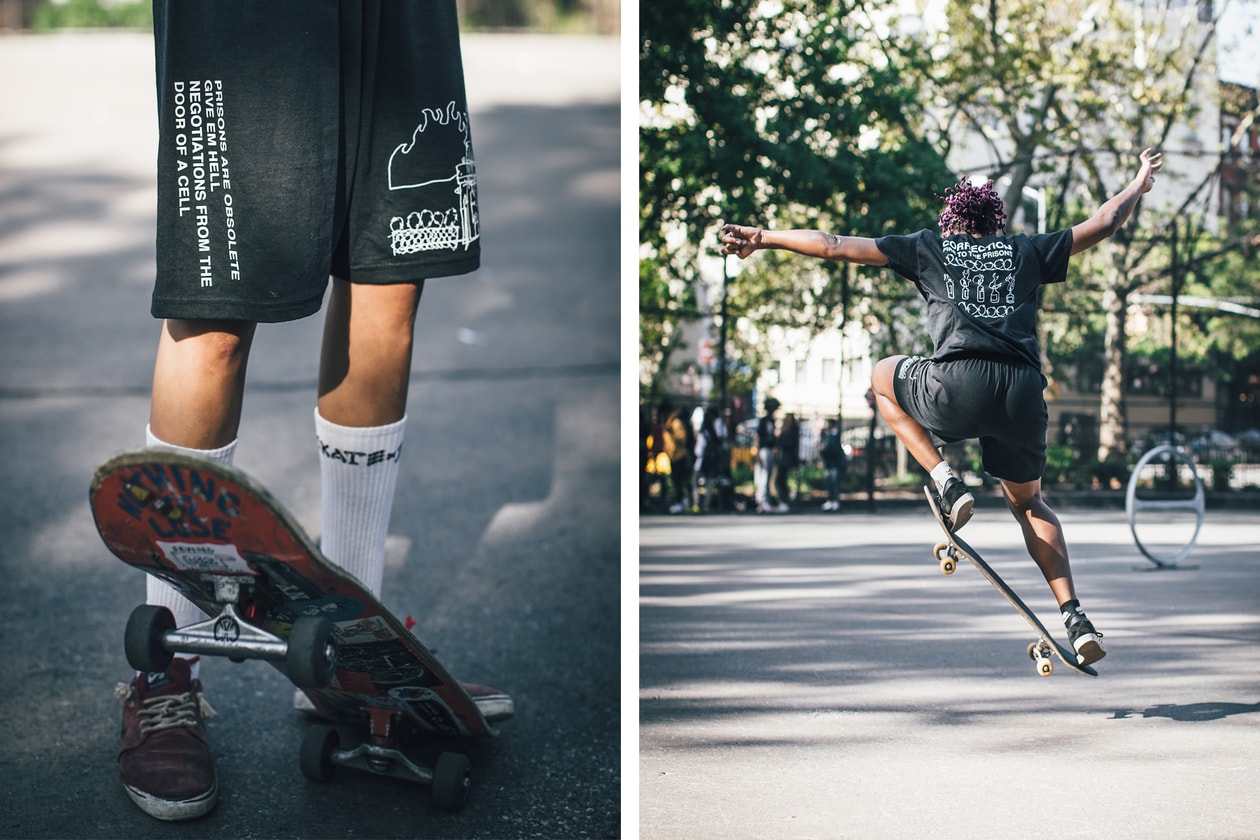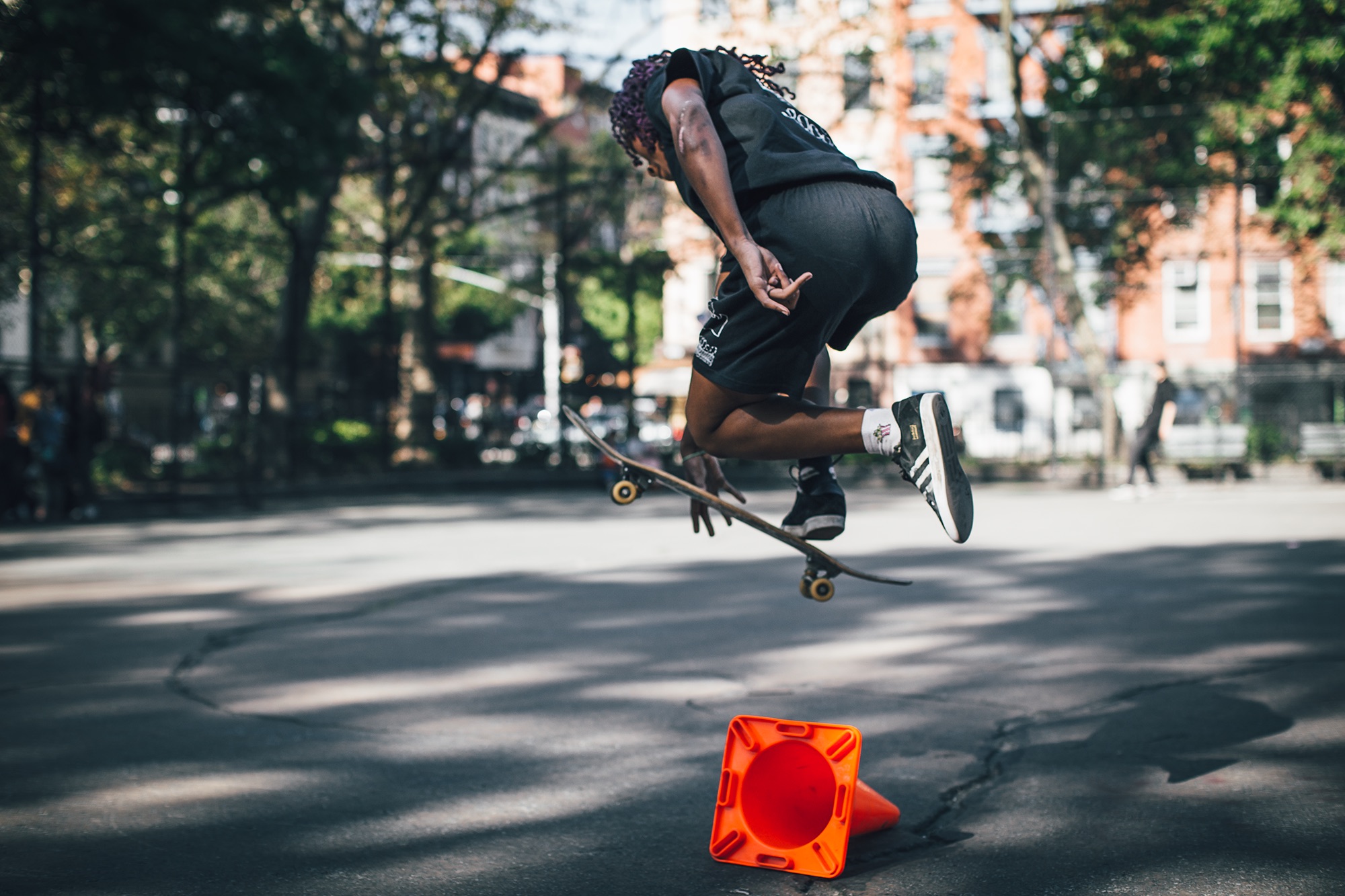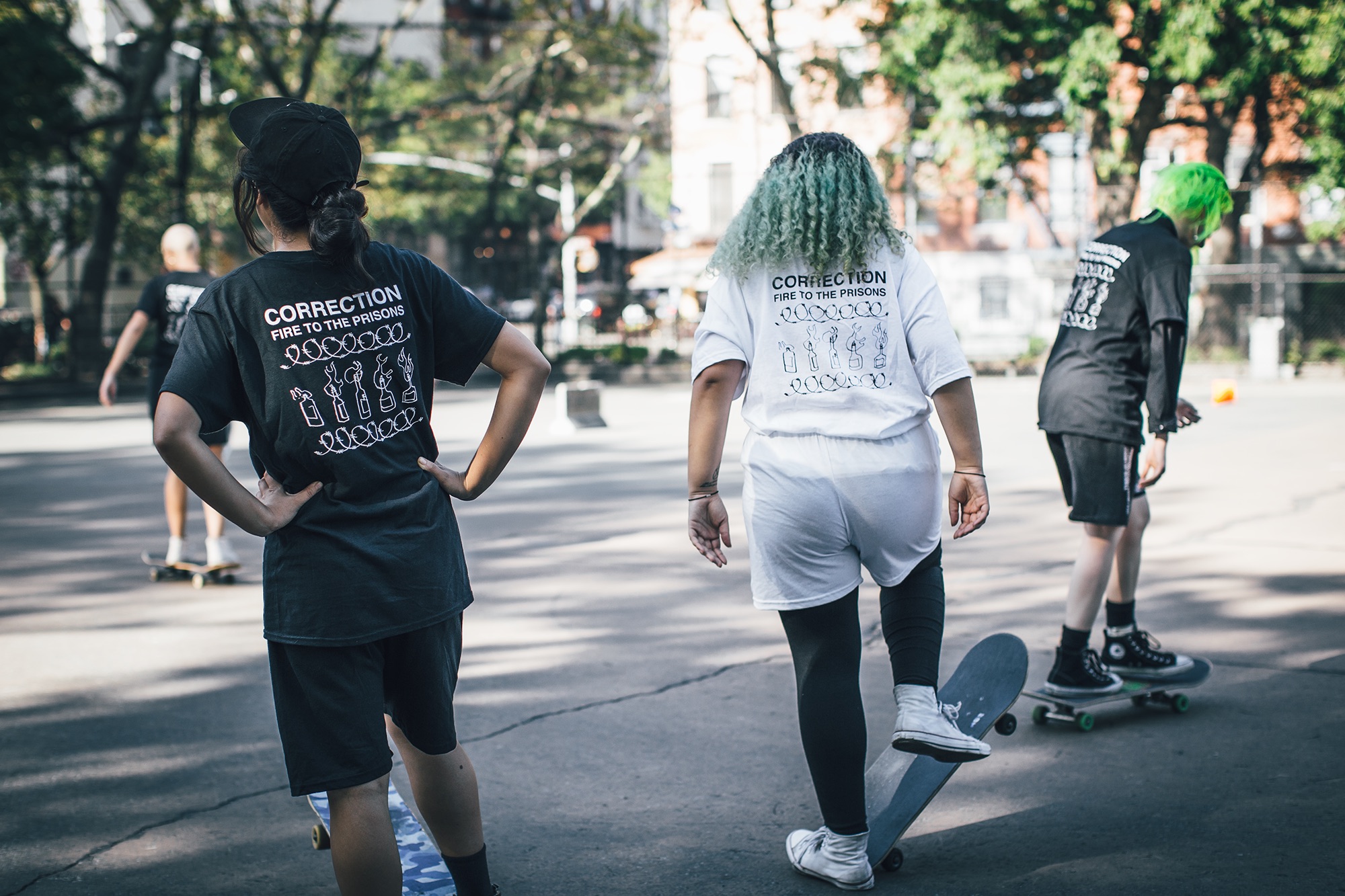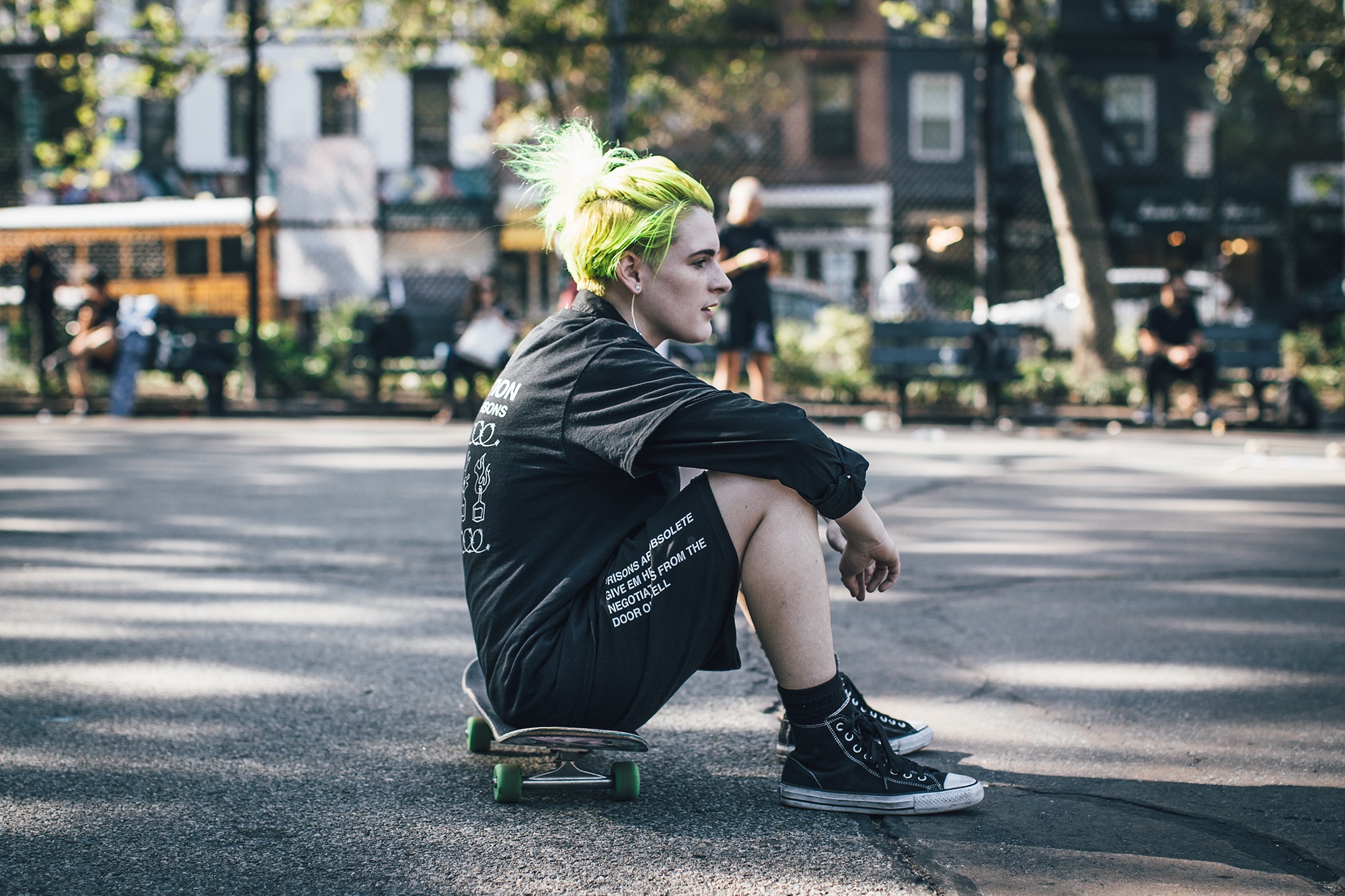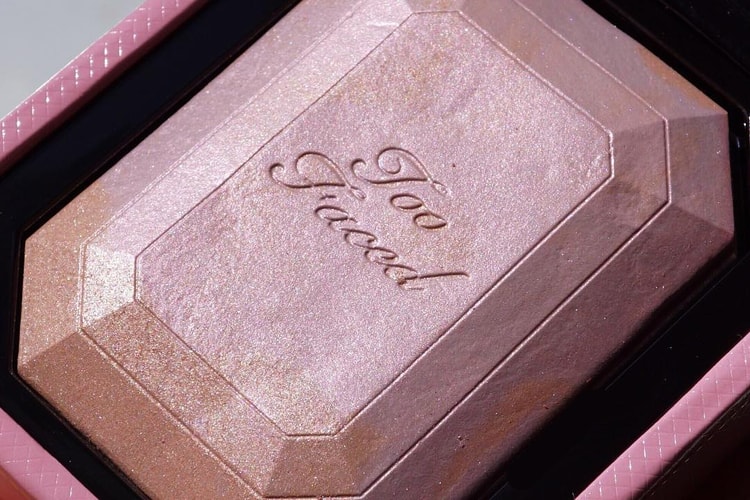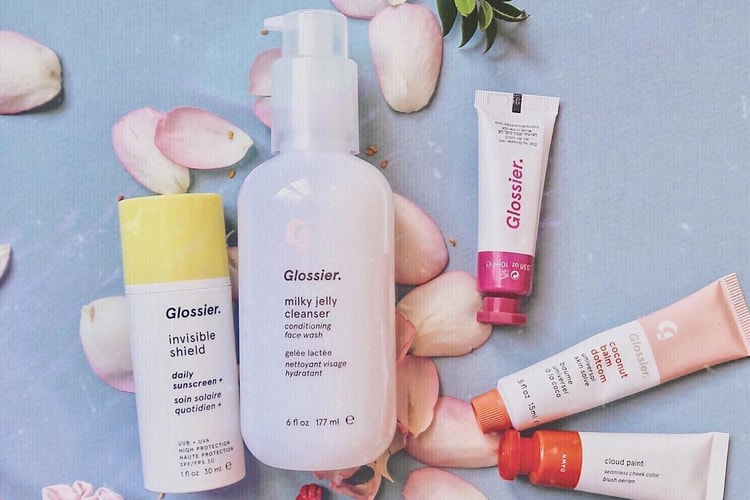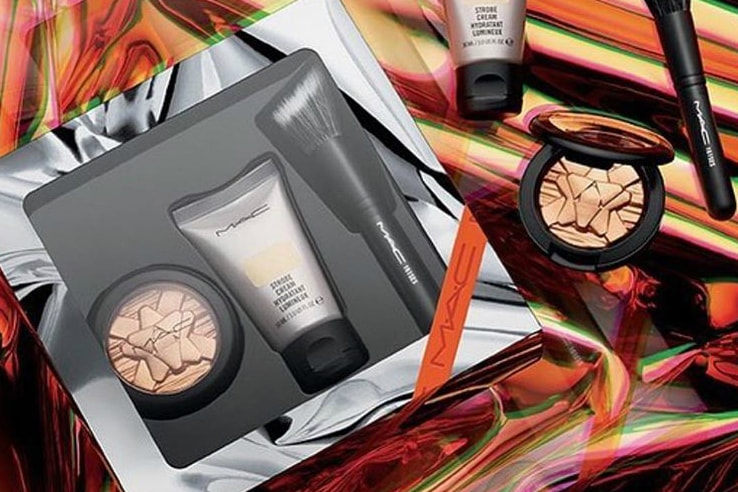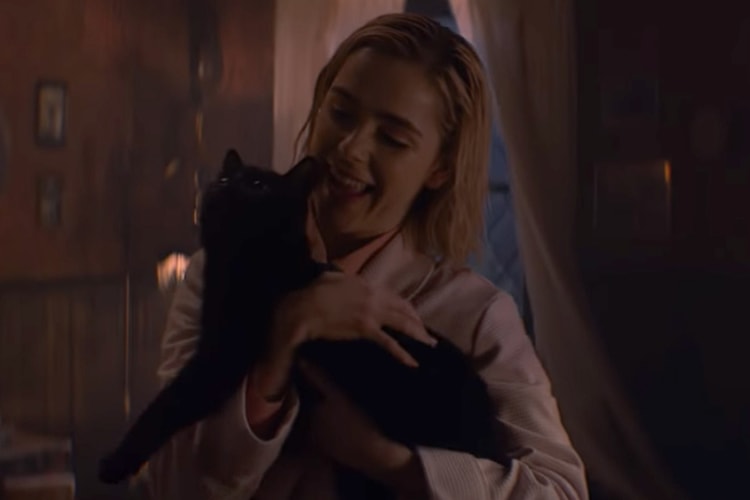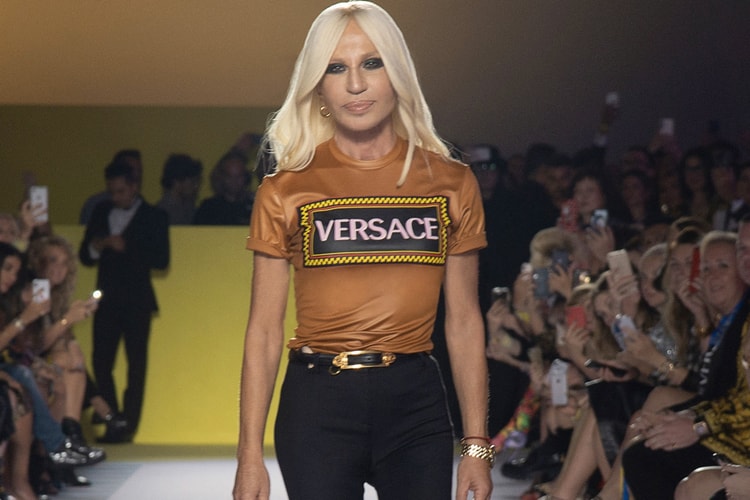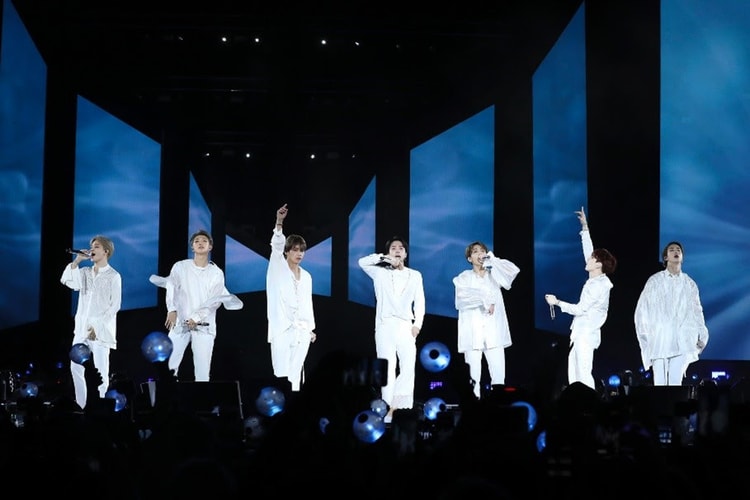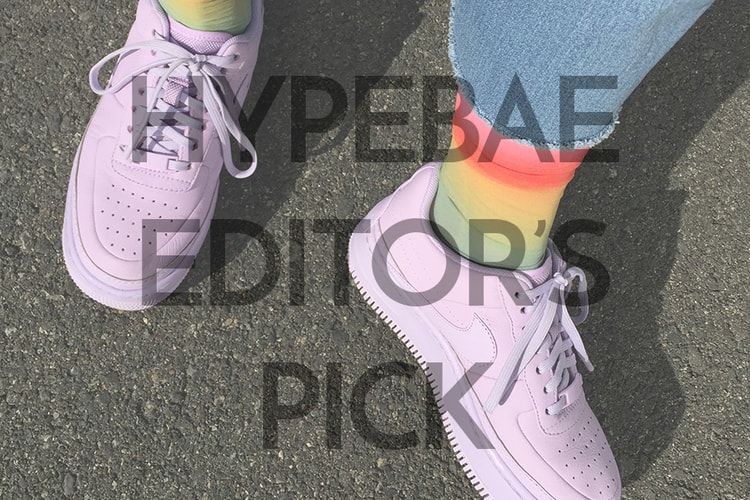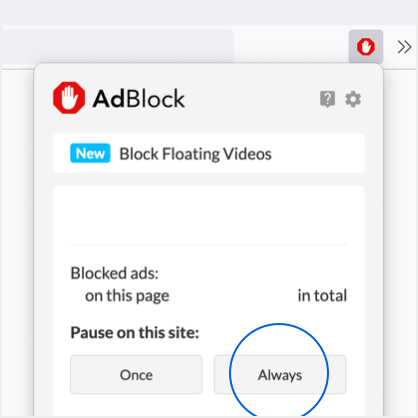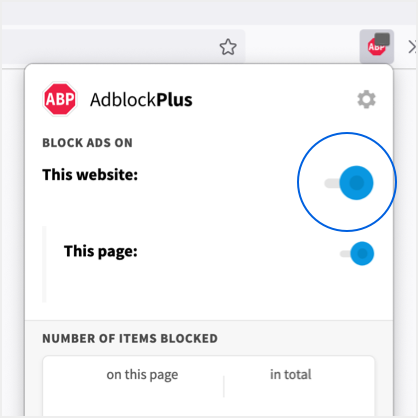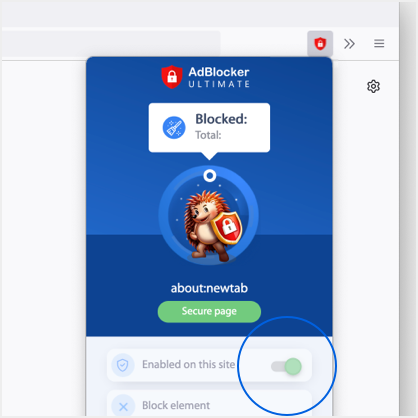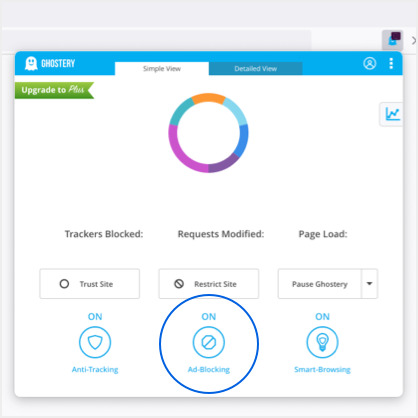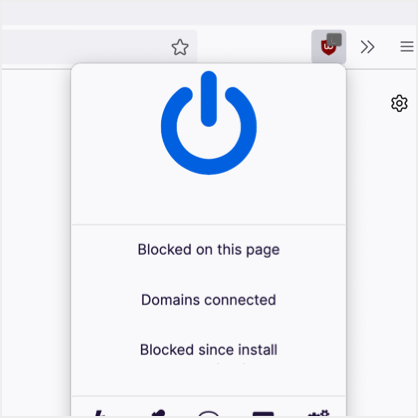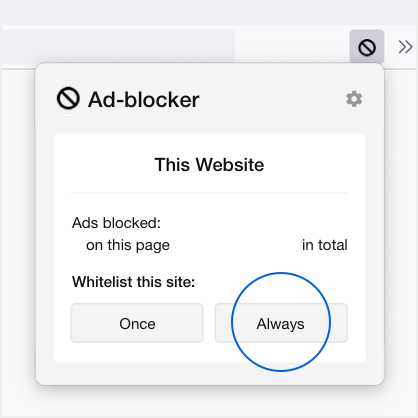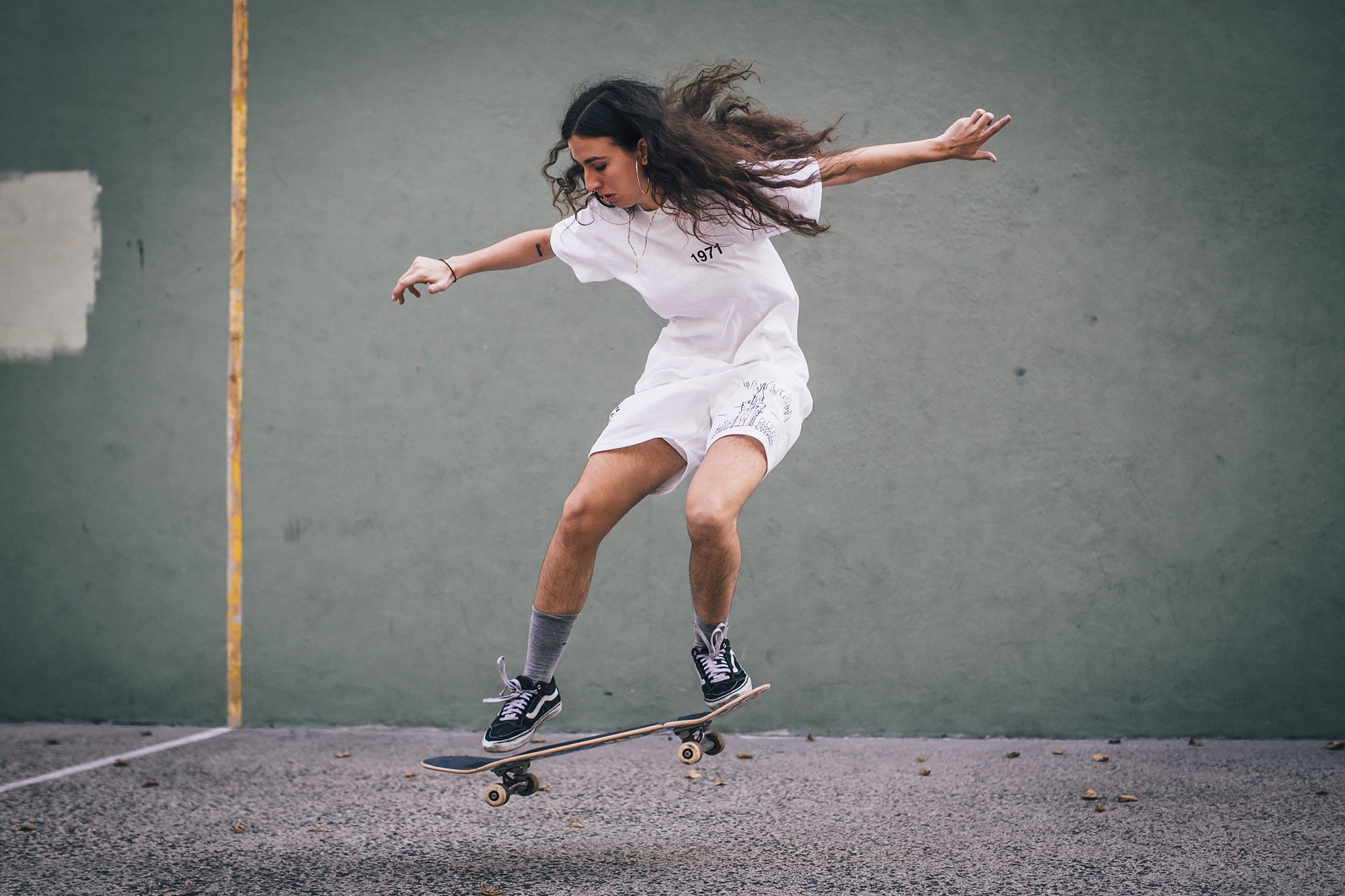
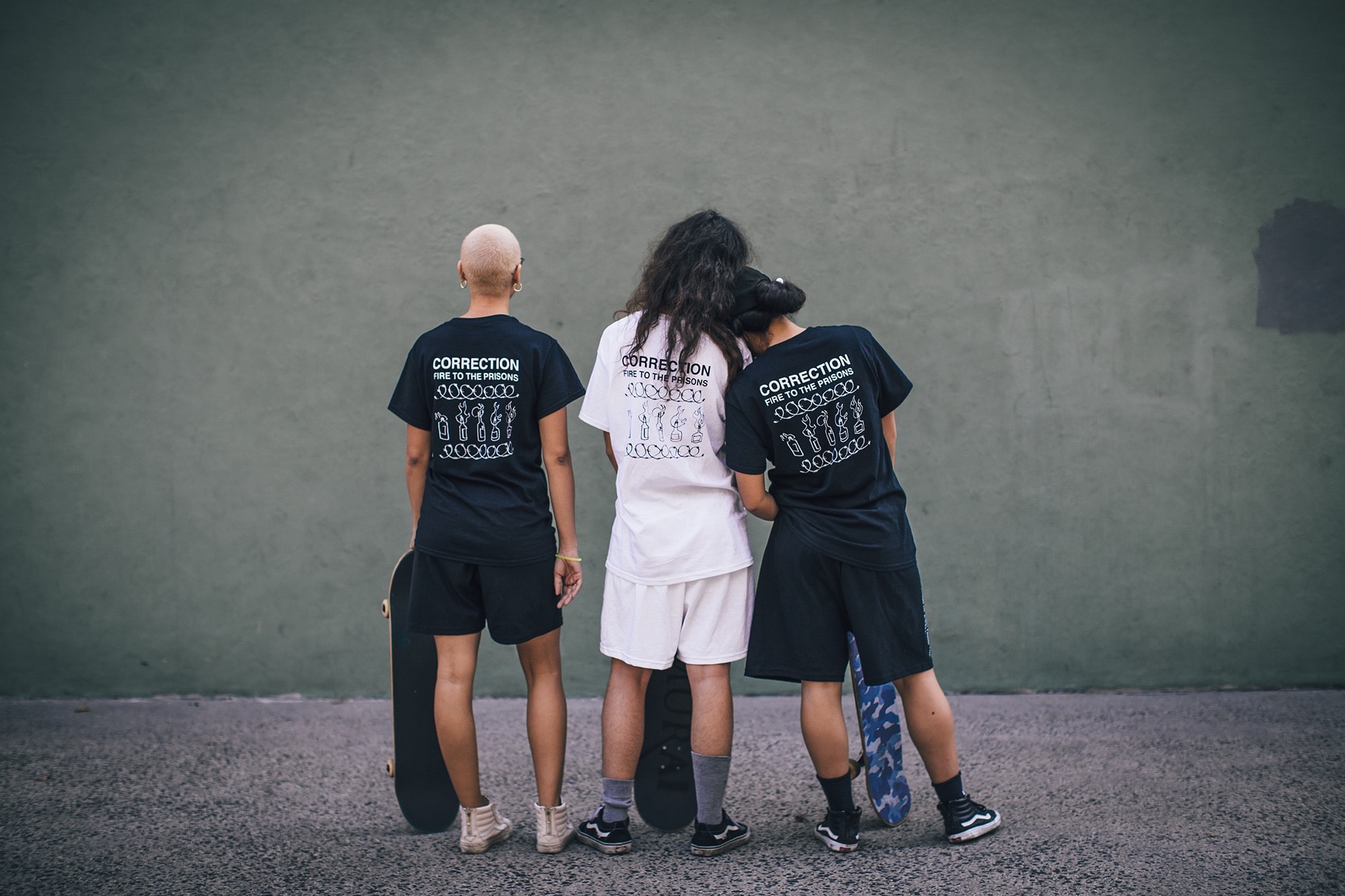
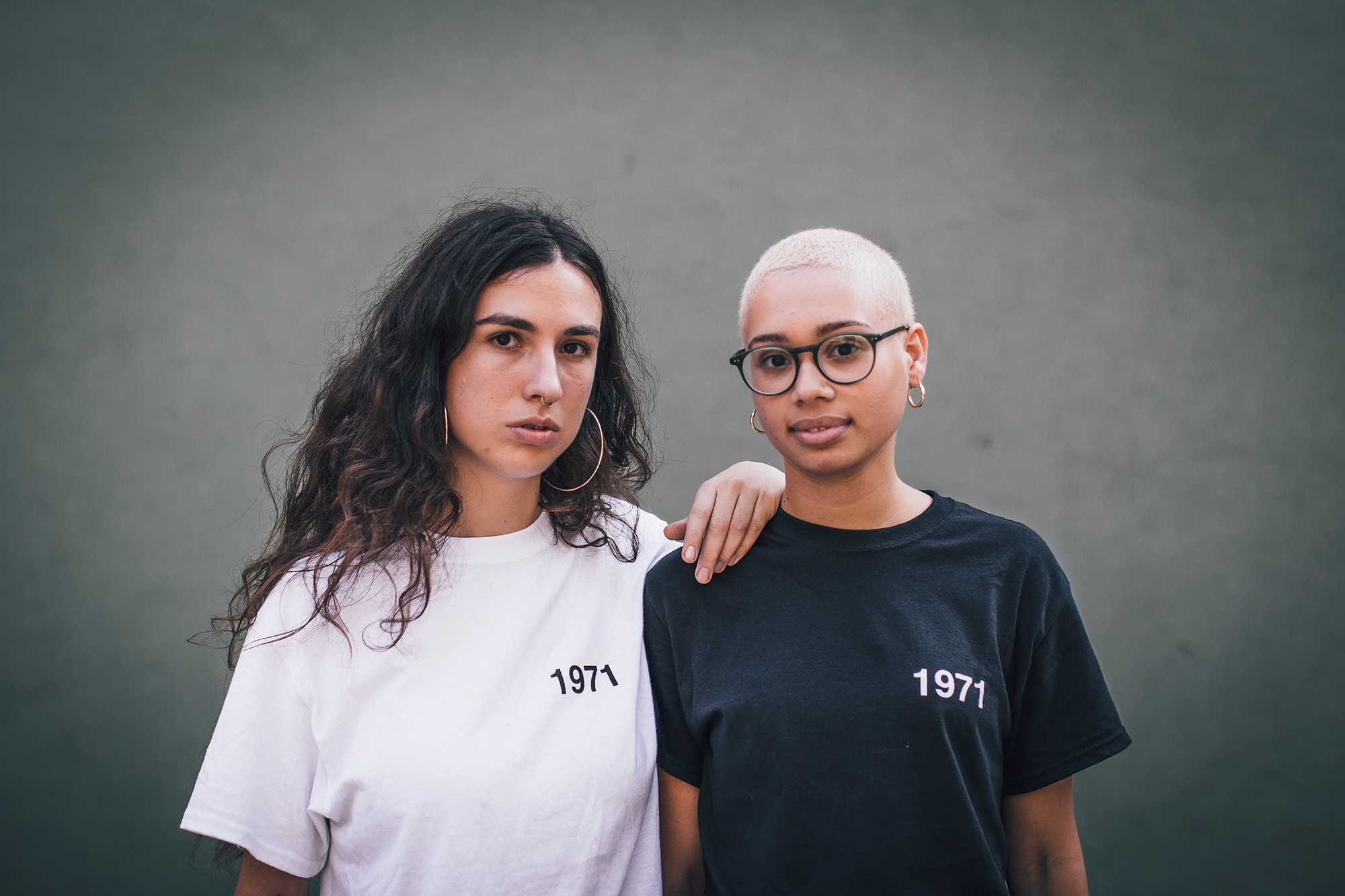
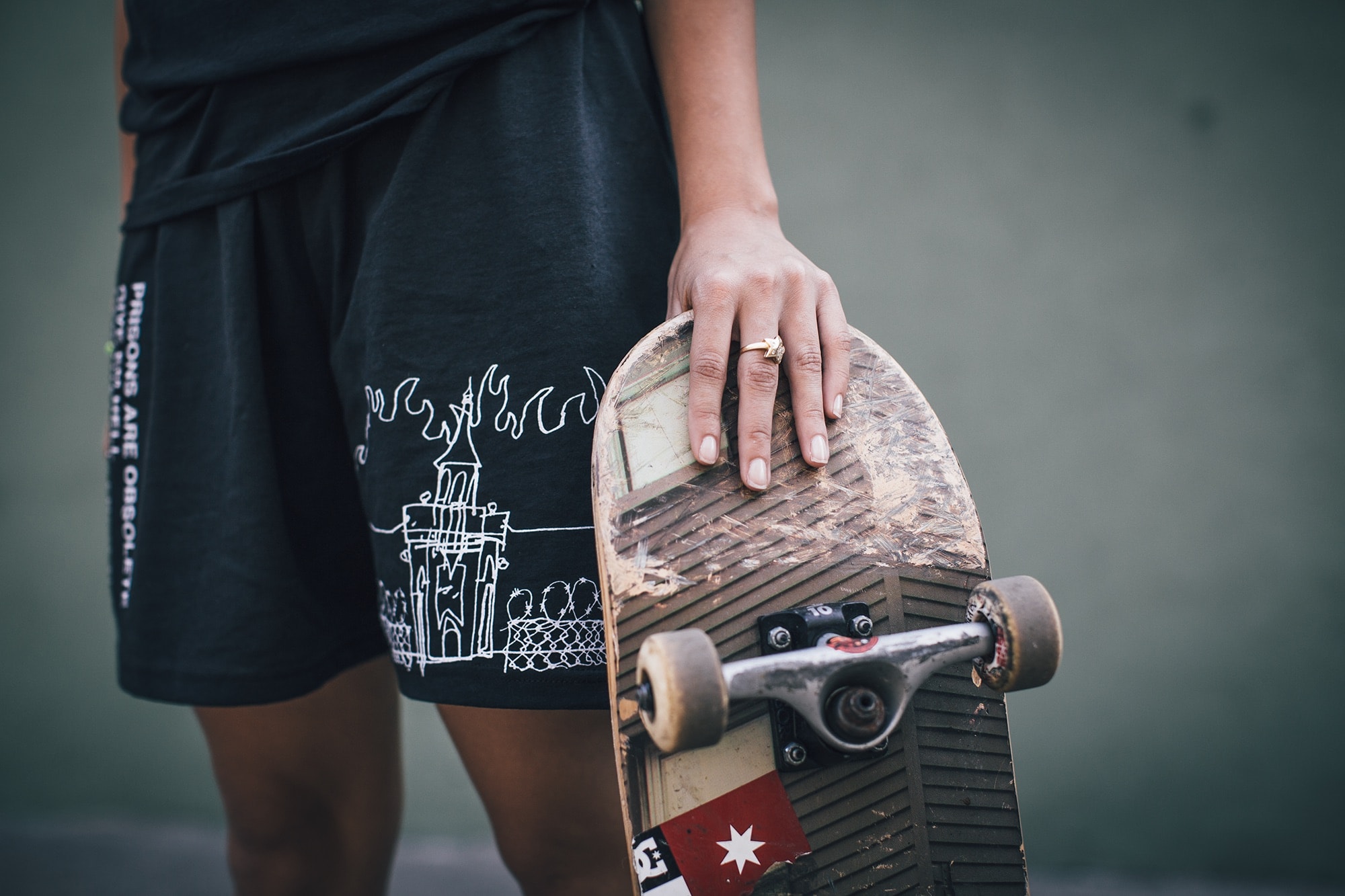
The Brujas Skate Crew Is Radicalizing More Than Just Skateboarding
The POC skate crew on creating safe spaces, using their platform and their 1971 line.
It’s easy to label Brujas as what they appear or are presented to be: an all-girl skate crew hailing from The Bronx, New York. But you should never judge a skateboarder by their deck. Skateboarding is what brought them together after Arianna Gil and Sheyla Grullon founded the group in 2014, but since then, Brujas’ members are collectively shredding every misrepresentation and barrier of what it means to be “female skateboarders.” Therein lies part of the problem, because yes, while it was created in part as a response to exclusivity in the male-dominated space, Brujas themselves are not male-exclusive — in fact, it’s their own gender-neutral space that also counts members who exist beyond the gender binary.
Naturally, femininity plays a circumstantial role in their narrative, but that’s only one bit of who the Brujas are. “I thought it would be cool to start talking really loudly and uncompromisingly about our gender, economic, and racial positionality,” explains Arianna. Brujas are pushing the conversation beyond the lens of the “female skateboarder” — something that’s become a commodified object of fascination to outsiders — onto the bigger picture by using the crew as a platform to address and help radicalize the issues that not only affect themselves, but the communities and world around them.
The Brujas have a shared sense of responsibility to empower all marginalized groups, regardless of how they identify — female, male, black, brown or otherwise. For their latest initiative, the 1971 Collection, Brujas honors the current prison strikes taking place in America and the 45th anniversary of the Atticus Prison Uprising, during which prisoners rioted and seized control of the upstate New York prison for four days, demanding prisoners’ rights and protesting physical brutality. Designed by emerging artists CZARQUAN of Nocturnal Sons Posse and Robin Giordani of The Corner Society, proceeds will benefit funding support for queer and trans people of color imprisoned because of their activity in street culture. Find out more about Brujas and the project via our conversation with Arianna and Isabelle Nastasia below.
Female skateboarding is like a subculture within a subculture, so were there any challenges to becoming accepted in this male-dominated space? A pillar of skateboarding is not caring about fitting in but is it something you struggled with within this community itself?
Ari: I don’t think Brujas is fully interested in being “accepted” into skateboarding, we are literally carving our own lane and making our skate-culture exactly what we want it to be for each other. Skateboarding as a lifestyle is more than just your time skating in the streets or skating spots, it’s a 360-degree experience, so naturally Brujas has to re-envision everything we do in a day. It is kind of wild seeing male skaters wear our stuff, especially the rappers and skaters in the oversized pink hoodies. We are more than being accepted, we are creating space, that feels safer and more progressive, for ourselves and our male friends to join. We are making strides to help men overcome their relationship with toxic masculinity and grow into a healthier gender identity that isn’t about differentiation through violence but collaboration. I think one of the greatest challenge is ensuring that dialogue is bigger than “girl power” and also addresses the premature death, sexual assault, and mental health issues that women of color face because of the extremely ubiquitous and dangerous nature of patriarchy.
What makes Brujas a different entity in skateboarding is that we are committed to the exploring the politics of skateboarding, public space, and youth culture.
In what ways do Brujas challenge the idea or stereotypes of who a skateboarder is?
Ari: Even given the wildly eclectic group we are, the press has tried to strip us down to “All-Latina, Bronxite, Skaters” and the truth is that Brujas, since the very very beginning, despite being committed to creating space for femmes and women, has been a gender neutral space with a lot of male-identifying members. Because you don’t see a lot of urban women of color making up the skater “demographic” we’ve received a certain level of notoriety for being different, but what makes us different is our community mindset and political goals. I think what makes Brujas a different entity in skateboarding is that we are committed to the exploring the politics of skateboarding, public space, and youth culture.
How has this crew helped you define your own sense of self?
Ari: After dealing with so many inaccurate media representations of my crew that harped liberal — as in not radical — and reductionist summaries about our genders and politics, I started to gain the confidence to reject associations that gave me legibility within the gender binary. I don’t want to be consumed and chewed out by the public so I’d rather do things that make no sense to anyone else, like have really hairy legs and use “they,” “them” and “theirs” pronouns but still fuck straight dudes without cause, or organize capture the flag games and call them skateboarding events. To me Brujas is like DADA to skateboarding, I don’t want it to be reduced to a certain art expression or male set of standards of skateboarding, it’s free-form and in that way I have accepted that I am also a free-form individual without a static gender identity.
What are your thoughts on this recent commercialization and “trendiness” of skateboarding taking place right now?
Ari: I don’t believe there is truly such a thing as ethical consumption under capitalism, therefore I don’t invest in the narrative that visibility and acceptance into a system of gross inequality and hierarchical domination will lead to anything but reform. The public and media is consuming us right now but isn’t invested in our well-being the way that we are in each others. We will always have to put our own community sustainability and well-being above our relationship with the different components of the “trend machine.” It has been funny looking at people’s colorway choices this season and slew of content related to femmes in skateboarding and know that we played a huge part in creating that wave, but we are more invested in how the politics are going shape waves and inspire the youth to take action against the oppression we face on a daily basis. 1971 was a specific way of launching these priorities, creating agitational propaganda to spark critical resistance and consciousness amongst youth while also organizing material resources to directly support people.
Your crew is about more than being a group of WOC who skate together. How are you using Brujas as a platform to spread awareness on other political ideals?
Ari: One of the definitions of politics that materialists often employ is all things related to the quality of life, including being able to go to the doctor, food, hygiene, the money in your bank account, your access to a bank account, your ability to move about the world without being subject to violence. It’s election season and most people during this time, and in general, are thinking about politics as purely related to the institution that governs us. I think that understanding politics as more broadly related to how people experience their lifestyles can help build a bridge between notions of anarchist and marxist politics and lifestyle branding. A lot of people who are obsessed with lifestyle branding or promoting the art of lifestyle fall short when they fail to recognize that if their art is not committed to making lifestyle better for their community – not just themselves – it isn’t important. Brujas is pioneering a platform that is committed to using culture, taste-making, and lifestyle branding to materially improve the lifestyle of their historically colonized, oppressed, and policed community.
Izzy: It’s definitely not a coincidence this is dropping before the election, it’s our way of saying: Fuck what these candidates are feeding us, and the spectacle of it, we’re not interested in being governed whatsoever. Brujas x 1971 P.E. comes out of that sentiment.
We are more invested in how the politics are going shape waves and inspire the youth to take action against the oppression we face on a daily basis.
Why is the prison strike and other prison issues and causes important to Brujas?
Ari: Brujas face criminalization daily so it’s not about a “cause” whatsoever as much as it is about self-advocacy, determination, and community resistance and resilience.
Izzy: 45 years ago, an uprising led by black prisoners took place inside a New York state prison called Attica. Today, there’s a national prisoner strike going on inside of prisons and jails across the country, and some countries abroad. But the truth is, I know from various anti-prison and anti-police organizing I’ve done in my life that a riot, or some kind of rebellion probably happens at least once a day inside of a prison in the United States. We just never hear about it on the news. We’re pointing down the wormhole. People say millennials are defined by our relationship to the birth of the Internet – that’s true for sure, but years from now, we’ll be able to say we were 18, 22, 25, whatever age, when the largest prisoner strike in U.S. history was going down, and what were we doing to support people facing criminalization? We’re just doing a sliver of the work abolitionists and people on the margins have been doing for hundreds of years: fundraising, organizing our communities, producing propaganda to make sure the ideas being produced inside of prisons are proliferated: fire to the prisons, tear down the walls, give them hell. “Them” meaning prison guards, police, politicians, the whole fucking system.
I think “Brujas” as a brand and a crew is so significant: to name the group that and align yourself with heretics and other traditions that have been deemed deviant, and people whose reproductive labor is mined and extracted by capitalism. We think it’s important to show love for people taking action inside of prisons, who refuse to be governed by these dehumanizing structures, and to support people in our community on the outside of prisons who are consistently targeted by the police state. That’s what the Brujas x 1971 collab is about.
Along with this two-piece, what other ways are you getting involved?
Izzy: There are two main ways Brujas is getting involved in anti-prison; by organizing, moving coins in order to materially support people who are affected by the prison system, either because they are incarcerated or are constantly being harassed by the police; and by encouraging a new political subculture.
Ari: Definitely. I think a big part of 1971 is about bringing the discourse of ‘prison abolition’ into our communities, without the kind of traditional political didacticism we usually see. In terms of that material support and what it looks like: all the money from 1971 is going to a group called F2L that supports queer and gender nonconforming people of color facing time in the prison system for being poor, gender deviant, being in the sex trades, and really for just trying to live. We’re splitting the profits with F2L to support Brujas kids in our New York communities who are being criminalized for their participation in street culture.
Izzy: It’s interesting because I think people have this idea that in order to “get involved” you have to do something huge. In some ways, that’s necessary. We do need to be willing to take big risks and conduct experiments if we want to see change in the long run, but basic day-to-day shit is really necessary, too. I read an article in The New Yorker a couple months ago about what abolitionists were really doing during what we historically are taught is “when slavery was legal.” The reason why I put that in quotes is because when slavery was abolished by the 13th amendment, there was written into the constitution an exception that actually says: it’s fine to treat people as slaves if they are convicted of a crime. When we’re taught about the underground railroad, we’re taught that it was clandestine, progressive white people and free black people helping enslaved black people travel safely from the South to the “free” North, but according to the author of this New Yorker story, actually a lot of what people were doing was very banal work: political education, fundraising, legal assistance. We’re really just doing that kind banal work, it just happens that we’re in a position to produce something people want to buy, and move coins to people who are incarcerated and otherwise fucked over by the system.
Ari: Yeah. 1971 is us using our resources to make an intervention, a small intervention but still – to literally slow the flow of youth of color into prisons, where they will face modern-day slavery. That’s evoking the legacy of the underground railroad, that’s material support. I also think we wanted to highlight that the current differentiation of criminal activity into categories that are valid and invalid is harmful. It distracts us from identifying poverty exploitation and alienation produced by capitalism as the real culprit of criminality.
Why do you think it’s important for not just Brujas but young people in general to take part in activist movements of any kind?
Izzy: So, I think it’s important to say that Ari and I actually met when they were 15 and I was 17. We were doing political education with other high school students about structural racism in the wake of Hurricane Katrina. That experience of activism, trying to get young people involved, especially when “social justice” was not considered “cool” and there was no social capital to be gained by being “woke” at the time; it was a lot different. Today, I think the landscape is a bit different because of the way the mainstream has recuperated anti-racism and queerness. There’s a lot of talk about visibility and representation but in actuality that means bolstering capitalism and it means assimilating into “the norm.” We don’t see that as a good thing. There’s very little talk about transformation or destroying the status quo completely to build something else. I think it’s important for young people to be a part of activism, in ways that make sense to them, but I also recognize that the political Left is in shambles and there aren’t a lot of compelling ways for people to enter into radical subcultures. It’s actually all pretty boring, but then there’s Brujas.
Ari: I think skateboarding for Brujas is about claiming space. Brujas is about creating space. Because of gentrification and the depoliticization of youth culture that has resulted from this obsession with “success” or “making it” – in music, art and fashion – under capitalism a lot of the spaces that once created political cultural space are no longer. You can read more about our critique of urban entrepreneurialism here.
Izzy: For sure. People just a little bit older than us used to be able to go to spaces like ABC No Rio, or some small DIY space, go to a punk show, pick a zine that mentioned something about the police state, or gender abolition, and it would blow their world wide open. Those spaces don’t really exist any more, so people in our generation don’t really have access to underground agit-prop – by that I mean like pamphlets, a poster, or maybe band lyrics – the way, say, older millennials or Generation X did. We see 1971 as a kind of political propaganda. We called it P.E. as a nod to our phys ed outfits in high school but really P.E. stands for political education. We feel like 1971 and projects like it have the capacity to fill the void of DIY spaces in order to give kids an entry point into these sorts of radical ideas and organizing.
Learn more about 1971 via Brujas’ Kickstarter campaign.
